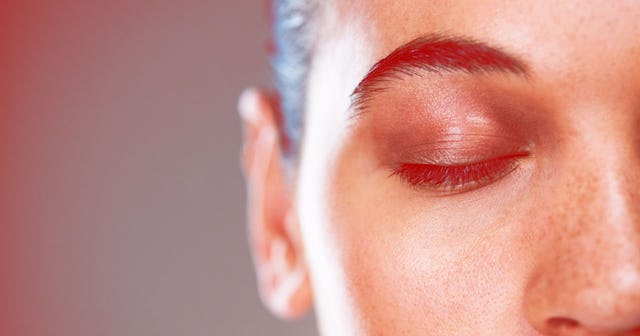'Natural' Skincare And Makeup Are Unregulated — Here’s What That Means

Recently I overhauled my skincare and makeup collection. For years I’d been burning through leftover samples from my long-ago days as a makeup artist. But times have changed since then, and so have my skin’s needs. Shopping for new products in the age of “natural” everything and finding the right skincare has been complicated to navigate. Why? Because “natural” isn’t the same from brand to brand. It’s great to say I’m going all-natural as you toss the latest trending skincare into your basket, but is it really “natural”? What does “natural” even mean?
When we say “natural” skincare and makeup products are unregulated, it means that there is no black-and-white universal standard. Basically, we don’t really know what it means because there isn’t a set criteria. And I’m not talking about lead-based lipsticks or any of the “natural” makeup hacks our long-ago ancestors employed. Yes, mercury-laced skin-lightening products, I’m looking at you.
Thankfully, today we have the Natural Products Association (NPA) who “developed the Natural Standard and Certification for Personal Care Products, a set of guidelines that dictate whether a product can be deemed truly natural.” Those guidelines look at what the product is made out of and how safe those ingredients are. They also look at the practices people use to test these products. Lastly, they consider how sustainable the ingredients are, as well as the packaging.
“Natural” Ingredients and Ethical Sourcing
What comes to your mind when you hear natural ingredients? Things found in nature, right? Like avocados. They are delicious on toast and tacos, great in smoothies, but on your face? Well. I mean, it’s not the worst thing you could use. Unless you are allergic to avocado (my sincerest condolences). So avocado is safe, but I bet you that isn’t the only ingredient making up your “all natural” avocado moisturizer. I actually have such an eye cream. Not because it was “natural” but because it was a free sample (and, who doesn’t love free samples?).
This particular cream claims it contains 98% “natural” ingredients. At first glance, you might think the only ingredients are avocado oil and hyaluronic acid. That’s pretty natural. But apparently, those are not the only ingredients involved. There are 25 other ingredients that make up the entire product. Now I’m not a chemist, so I don’t know what all these ingredients are. Someone, somewhere, once upon a time, told me if I couldn’t pronounce the ingredients in my food, then I shouldn’t be eating it. Because obvi, not natural ingredients. Should the same go for our skincare?
Equally important, where are they getting their ingredients from? Nothing screams “natural” like responsibly sourced ingredients. What do we mean by responsibly sourced? It means the ingredients being grown and harvested in a way that doesn’t negatively impact the people doing the work or the environment. Which does not just stop at the product itself. The containers and packaging that hold your product should be eco-friendly, recyclable, or biodegradable to fit the “natural” criteria.
What Does This Mean For Your Skincare?
Are you annoyed yet? Because I’m annoyed having to use quotations around everything we’ve discussed as “natural.. This is done intentionally because that “natural” granola vibe looks different for everyone.
“Natural” has been a buzzword in the beauty industry for a while now. And everyone has a different spin on it. Some companies slap “natural” on their products as a marketing technique. Others formulate and carry products that keep in mind the guidelines set by the NPA. According to information from the NPA, if your product has a third-party label from the NPA or USDA’s certified organic, it’s more likely that the product you’re investing in is indeed “natural”.
In the end, when it comes to deciding what kinds of skincare and makeup products you want to include in your routine, you’ve got to do what is best for you. Does your skin produce more oil than most? Or is it painfully dry and crepe-y (raises hand)? What about line, wrinkle, and anti-aging concerns? Keep in mind that not all chemicals used in skincare (“natural” or otherwise) are bad when used in moderation.
While there is nothing wrong with trying to use fewer additives, chemicals, and more natural ingredients, be aware that you’ll still have to do your homework. Unlike eating an all-natural diet, where you can see and prepare your own food from scratch, skincare and makeup are an entirely different and more complicated beast. Before investing in “natural” products, make sure you can answer the questions:
Do I know what is in this, and is it safe? Are the ingredients being used sourced ethically? Are the product and packaging eco-friendly? Has this company gotten a third-party seal of approval?
But, most importantly, is this what my skin needs? I know my skin needs hydration and some fine line and anti-wrinkle action. So please excuse me while I go slather and dab my skin in products that work best for me. Yes, including a little “natural” avocado eye cream, because who doesn’t love avocado?
This article was originally published on